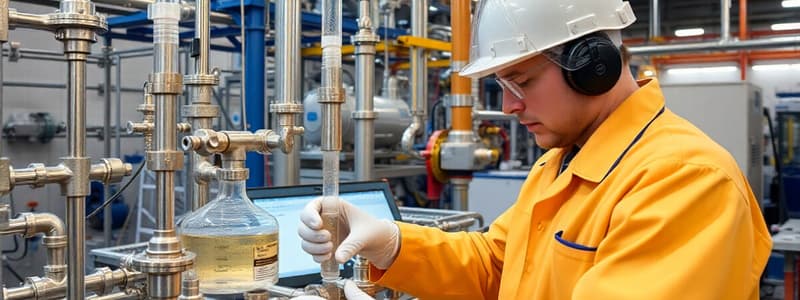Podcast
Questions and Answers
Which four areas of knowledge do chemical engineers use to solve practical problems?
Which four areas of knowledge do chemical engineers use to solve practical problems?
- Mathematics, Computer Science, Economics, Biology
- Biology, Economics, Mechanical Engineering, Geology
- Mathematics, Physical sciences, Life sciences, Economics (correct)
- Physics, Statistics, Chemistry, Engineering Design
Chemical engineering emerged prominently before the Industrial Revolution.
Chemical engineering emerged prominently before the Industrial Revolution.
False (B)
What major shift in production methods occurred during the Industrial Revolution?
What major shift in production methods occurred during the Industrial Revolution?
A shift from batch processing to continuous processing.
In 1888, _____________ started a new curriculum known as Course X for Chemical Engineering.
In 1888, _____________ started a new curriculum known as Course X for Chemical Engineering.
Which of the following is a key achievement of chemical engineering?
Which of the following is a key achievement of chemical engineering?
Match the following achievements of chemical engineering with their descriptions:
Match the following achievements of chemical engineering with their descriptions:
Chemical engineering relies on the application of chemistry along with other engineering disciplines.
Chemical engineering relies on the application of chemistry along with other engineering disciplines.
Name one of the synthetic materials that chemical engineers contributed to during the plastics age.
Name one of the synthetic materials that chemical engineers contributed to during the plastics age.
Which synthetic fiber was first extruded in 1910?
Which synthetic fiber was first extruded in 1910?
Chemical engineers have developed synthetic rubber.
Chemical engineers have developed synthetic rubber.
Name one of the grand challenges in chemical engineering.
Name one of the grand challenges in chemical engineering.
Chemical engineers use purified ________ and nitrogen for various applications.
Chemical engineers use purified ________ and nitrogen for various applications.
Match the following chemical engineering disciplines with their descriptions:
Match the following chemical engineering disciplines with their descriptions:
Which of the following is NOT a professional activity in chemical engineering?
Which of the following is NOT a professional activity in chemical engineering?
What is one application of chemical engineering in medicine?
What is one application of chemical engineering in medicine?
Chemical engineers are not involved in efforts to prevent future pollution.
Chemical engineers are not involved in efforts to prevent future pollution.
Flashcards are hidden until you start studying
Study Notes
What is Chemical Engineering?
- Chemical engineers use a combination of math, physical sciences, life sciences, and economics to solve real-world problems.
- They apply their knowledge of chemistry in addition to other engineering principles.
- The versatility of Chemical Engineering comes from the combination of math, physics, chemistry, and biology, which can describe almost all physical phenomena.
The Impact of Chemical Engineering
- This field has a significant impact on many aspects of modern life.
History of Chemical Engineering
- Before the 18th century, industrial chemicals were primarily produced using batch processing.
- The Industrial Revolution, from 1700 to 1800, saw a shift from batch to continuous processing in industrial production.
Chemical Engineering Education
- In 1882, the first course in "Chemical Technology" was offered at University College London.
- The first course in "Chemical Engineering" was offered in 1885 at Central College (later Imperial College), London.
- In 1888, a new curriculum called "Course X" was introduced by the Massachusetts Institute of Technology (MIT) to focus on the applications of chemistry to engineering problems.
Chemical Engineering Achievements
- Crude oil processing: Chemical engineers developed techniques to break down long carbon molecules into smaller ones, like ethylene and propylene, enabling the utilization of crude oil.
- Plastics: Chemical engineers played a crucial role in the development of plastics during the 1930s, creating materials such as nylon, polyvinylchloride, acrylics, polystyrene, polyethylene, and polypropylene.
- Synthetic Fibers: Starting with rayon fibers in 1910 and nylon in 1939, chemical engineers have driven the creation and production of numerous synthetic fibers, used in diverse applications like clothing, upholstery, carpets, and even bulletproof fabrics.
- Synthetic Rubber: Chemical engineers facilitated the development of synthetic rubber.
- Gases from Air: Chemical engineers pioneered the methods for processing and utilizing purified oxygen and nitrogen.
- Semiconductor Fabrication: Chemical engineers have been instrumental in the advancement of the electronics and computer industry through their contributions to semiconductor fabrication.
- Medicine: Understanding the body as a chemical system, chemical engineers have collaborated with physicians to develop medicines, replacement parts, and physiological support products.
- Environmental Protection: Chemical engineers actively engage in environmental technology to address existing pollution issues and prevent future contamination.
- Food: Chemical engineers have been key in producing fertilizers, such as phosphates and urea, as well as pesticides to protect crops.
- Antibiotics: Chemical engineers have developed methodologies for mass production of antibiotic drugs, including penicillin, discovered in 1929.
Grand Challenges
- The field of Chemical Engineering is now focused on tackling some of humanity’s biggest challenges, including:
- Making solar energy economical.
- Providing energy from fusion.
- Developing carbon sequestration methods.
- Ensuring access to clean water.
- Advancing health informatics.
- Engineering better medicines.
- Reverse-engineering the brain.
Professional Activities in Chemical Engineering
- The diverse applications of Chemical Engineering lead to various professional activities, such as:
- Process development research
- Technical chemical sales
- Process engineering
- Plant design and construction
- Environmental engineering
- Fundamental research
The Chemical Engineering Discipline
- The core areas of knowledge in Chemical Engineering are:
- Material balances
- Thermodynamics
- Fluid mechanics
- Heat transfer
- Mass transfer
- Reaction engineering
- Separation processes
- Process control
- Materials
- Economics
Studying That Suits You
Use AI to generate personalized quizzes and flashcards to suit your learning preferences.




